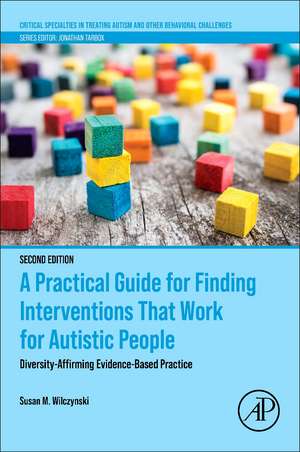A Practical Guide for Finding Interventions That Work for Autistic People: Diversity-Affirming Evidence-Based Practice: Critical Specialties in Treating Autism and other Behavioral Challenges
Autor Susan M. Wilczynskien Limba Engleză Paperback – aug 2024
- Presents a detailed description of the diversity-affirming evidence-based practice decision-making model
- Offers a framework that helps practitioners integrate the best available evidence with client values and context
- Demonstrates how to culturally adapt interventions and center decision-making on the client
- Guides practitioners through the process of assessing intervention outcomes that fit with client values and contextual variables
- Provides numerous concrete examples involving Autistic people holding many intersecting identities
Preț: 378.65 lei
Preț vechi: 470.89 lei
-20% Nou
Puncte Express: 568
Preț estimativ în valută:
72.45€ • 75.85$ • 59.95£
72.45€ • 75.85$ • 59.95£
Carte tipărită la comandă
Livrare economică 29 martie-12 aprilie
Livrare express 01-07 martie pentru 105.46 lei
Preluare comenzi: 021 569.72.76
Specificații
ISBN-13: 9780443156328
ISBN-10: 0443156328
Pagini: 300
Dimensiuni: 152 x 229 x 18 mm
Greutate: 0.52 kg
Ediția:2
Editura: ELSEVIER SCIENCE
Seria Critical Specialties in Treating Autism and other Behavioral Challenges
ISBN-10: 0443156328
Pagini: 300
Dimensiuni: 152 x 229 x 18 mm
Greutate: 0.52 kg
Ediția:2
Editura: ELSEVIER SCIENCE
Seria Critical Specialties in Treating Autism and other Behavioral Challenges
Cuprins
Section I: Evidence-based practice as a treatment selection model.
1. A brief overview
2. Ethics and evidence-based practice
Section II: Sources and strength of evidence
3. Evidence: Critically evaluating outcomes of single-subject research design studies
4. Systematic reviews
5. Alternate sources of evidence
6. Overestimating or underestimating evidence in behavior analysis
Section III: Social Validity and Initial Intervention Selection
7. Three dimensions of social validity
8. Social validity and your client
9. Social validity and interested parties
Section IV: Professional Judgment
10. Research alone is not the answer
11. Consensus-building without marginalizing Autistic clients
12. Initial intervention selection
13. Progress monitoring
14. What next?
Section V: Conclusions
15. Putting it all together for ethical service delivery
1. A brief overview
2. Ethics and evidence-based practice
Section II: Sources and strength of evidence
3. Evidence: Critically evaluating outcomes of single-subject research design studies
4. Systematic reviews
5. Alternate sources of evidence
6. Overestimating or underestimating evidence in behavior analysis
Section III: Social Validity and Initial Intervention Selection
7. Three dimensions of social validity
8. Social validity and your client
9. Social validity and interested parties
Section IV: Professional Judgment
10. Research alone is not the answer
11. Consensus-building without marginalizing Autistic clients
12. Initial intervention selection
13. Progress monitoring
14. What next?
Section V: Conclusions
15. Putting it all together for ethical service delivery
Recenzii
"As a practitioner committed to delivering compassionate, evidence-based care, I found A Practical Guide for Finding Interventions that Work for Autistic People, Second Edition to be an indispensable resource. Wilczynski’s focus on culturally sensitive, person-centered approaches fills a critical gap in our field, offering practical tools and insights for selecting interventions that are both effective and respectful of client autonomy. The inclusion of new chapters on diversity affirmation and ethics further elevates this guide, making it a must-read for any behavior analyst dedicated to social validity and meaningful client outcomes." -- Mychal Machado, Ph.D., BCBA-D, LBA, University of Alaska Anchorage
"Every practitioner and trainee who works with or aspires to work with autistic people should read this book. It goes beyond evidence-based practice to integrating compassion and respect with effective practice to recognize the impact of and honor the experience of autistic people with intersectional identities. The perspectives of autistic people who have shared concerns about the way they are treated come through loud and clear to motivate and inspire practitioners to prioritize autonomy, dignity, and the individual’s preferences, when identifying effective and culturally adapted interventions. about making ethical decisions. This book will be required reading in our BCBA preparation program!" -- Jennifer McComas, The University of Minnesota, College of Education and Human Development
"Every practitioner and trainee who works with or aspires to work with autistic people should read this book. It goes beyond evidence-based practice to integrating compassion and respect with effective practice to recognize the impact of and honor the experience of autistic people with intersectional identities. The perspectives of autistic people who have shared concerns about the way they are treated come through loud and clear to motivate and inspire practitioners to prioritize autonomy, dignity, and the individual’s preferences, when identifying effective and culturally adapted interventions. about making ethical decisions. This book will be required reading in our BCBA preparation program!" -- Jennifer McComas, The University of Minnesota, College of Education and Human Development








